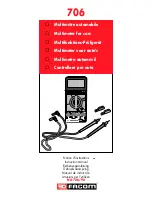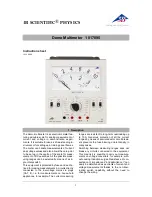
-16-
DC Current Measurement
Figure 6 shows a simplified diagram of the DC current measuring circuit. Here the resistors are placed across
the meter to shunt the current. On the 50
μ
A range, the current is fed directly to the meter and the voltage drop
across the meter at full scale deflection is .1 volt. On all of the other ranges, the full scale voltage drop across
the meter is .25 volts. A .5 amp fuse is added to the circuit for protection against overload.
Figure 6
Figure 7
AC Voltage Measurement
Figure 5 shows a simplified diagram of the AC voltage measuring circuit. Two diodes are added to the series
resistors to rectify the AC voltage. The input impedance on the AC voltage ranges is 9k
Ω
per volt. On the
250VAC range, the input impedance is therefore 2M
Ω
.
Figure 5
Resistance Measurement
Figure 7 shows a simplified diagram of the resistance measuring circuit. Here a known 1% resistor, in parallel
with the meter and the zero adjust resistors, is compared to the external resistor in a series circuit. The current
is supplied by the 3V battery on the X1, X10 and X1k ranges. On the X10k range, a 9V battery is placed in
series with the 3V battery to supply more current to the series circuit. To calibrate the ohms circuit, the external
resistor is made zero ohms by shorting the test leads together. This places the full battery voltage across the
internal resistors. The current in the meter is adjusted to full scale deflection, or zero reading on the dial. When
an external resistor is made equal to the internal resistance, the meter will deflect to half scale and the dial
marking will show its value.




































